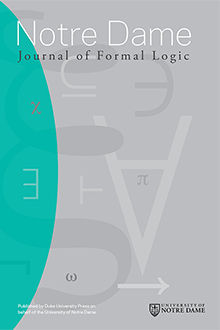Abstract
What is the philosophical significance of the soundness and completeness theorems for first-order logic? In the first section of this paper I raise this question, which is closely tied to current debate over the nature of logical consequence. Following many contemporary authors' dissatisfaction with the view that these theorems ground deductive validity in model-theoretic validity, I turn to measurement theory as a source for an alternative view. For this purpose I present in the second section several of the key ideas of measurement theory, and in the third and central section of the paper I use these ideas in an account of the relation between model theory, formal deduction, and our logical intuitions.
Citation
Eli Dresner. "Logical Consequence and First-Order Soundness and Completeness: A Bottom Up Approach." Notre Dame J. Formal Logic 52 (1) 75 - 93, 2011. https://doi.org/10.1215/00294527-2010-038
Information





